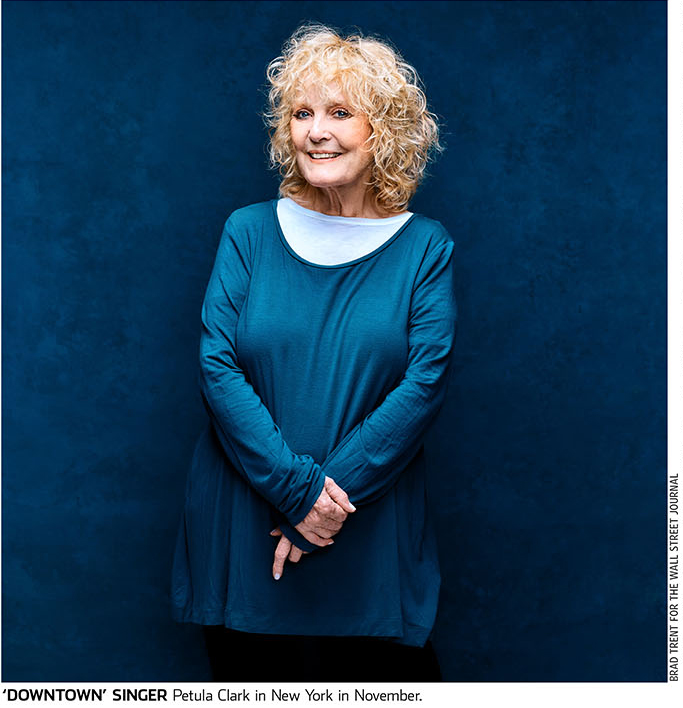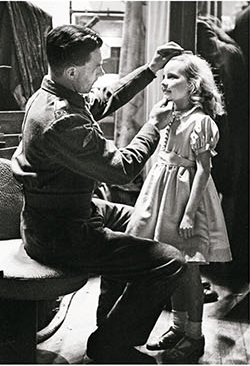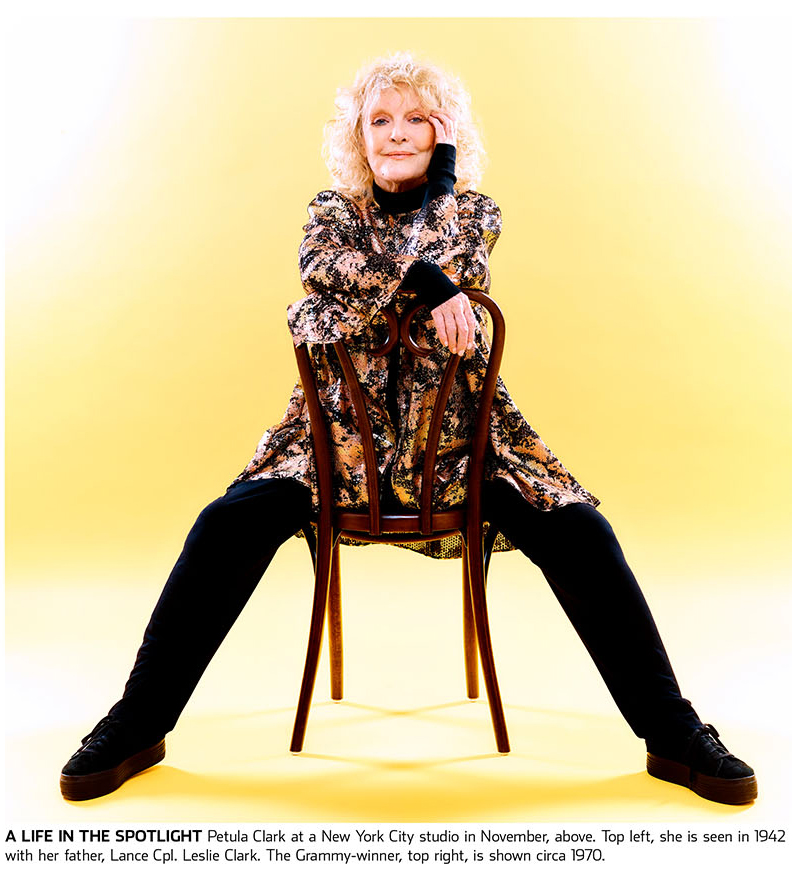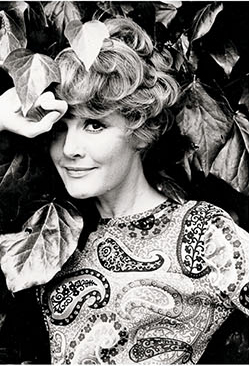

Petula Clark, 85, is a Grammy-winning British singer-songwriter and actress whose 22 U.S. hits include "Downtown," "My Love" and "I Know a Place."
Her new album is "Living for Today" (8MG). She spoke with Marc Myers.
Before my American hits in the '60s, before my popularity in France in the late '50s and before my British records and movies in the late '40s and '5Os, there was Wales. I was sent there to live with my grandparents in 1941, when I was 7. It would be the most memorable year of my life.
My family lived in Epsom,England, about 15 miles southwest of London. My dad, Leslie, was handsome and had wanted to be an actor. My mother, Doris, was very pretty and musical but not very social.
Both of my parents were nurses at our locaL hospital. When Britain entered World War II in 1939 my father went into the Army. We lived in an ordinary Little semi-detached house and lived an ordinary life-except we were being bombed all the time by Germany. Most of my
Before my American hits in the '60s, before my popularity in France in the late '50s and before my British records and movies in the late '40s and '5Os, there was Wales. I was sent there to live with my grandparents in 1941, when I was 7. It would be the most memorable year of my life.
My family lived in Epsom,England, about 15 miles southwest of London. My dad, Leslie, was handsome and had wanted to be an actor. My mother, Doris, was very pretty and musical but not very social.
Both of my parents were nurses at our locaL hospital. When Britain entered World War II in 1939 my father went into the Army. We lived in an ordinary Little semi-detached house and lived an ordinary life-except we were being bombed all the time by Germany. Most of my

schoolwork then was done in air-raid shelters.
My sister, Barbara, and I shared a room. She was four years younger than me, and we were quite different. Barbara was far more sensible. I had a ridiculous imagination. I saw spooky things all the time and must have seemed slightly mad. I'd walk down the Street in the pouring rain singing with my coat wide open. I was living a life in my head.
Singing came naturally to me. I listened to the radio and records from time to time. There was always music going on somewhere.
I sang only once in a local choir. I thought the music sounded boring, so I sang in harmony. Afterward, I was scolded and rapped over the knuckles. Then they threw me out of the choir.
Lots of children I knew had an equally peculiar childhood. We lived with the constant fear of bombings, hurried evacuations and the sudden tragic deaths of neighbors we had seen just hours earlier.
During the Blitz bombings
My sister, Barbara, and I shared a room. She was four years younger than me, and we were quite different. Barbara was far more sensible. I had a ridiculous imagination. I saw spooky things all the time and must have seemed slightly mad. I'd walk down the Street in the pouring rain singing with my coat wide open. I was living a life in my head.
Singing came naturally to me. I listened to the radio and records from time to time. There was always music going on somewhere.
I sang only once in a local choir. I thought the music sounded boring, so I sang in harmony. Afterward, I was scolded and rapped over the knuckles. Then they threw me out of the choir.
Lots of children I knew had an equally peculiar childhood. We lived with the constant fear of bombings, hurried evacuations and the sudden tragic deaths of neighbors we had seen just hours earlier.
During the Blitz bombings


in 1941, my mother sent Barbara and me to her parents' house in Abercanaid, in the south of Wales.
My grandparents were very poor. Their stone house didn't have running water or electricity, and the toilet was at the end of a long, thin garden.
My grandfather was still coal mining, and my grandmother cooked on an open fire. They both spoke Welsh, and soon so did I.
My grandparents were very poor. Their stone house didn't have running water or electricity, and the toilet was at the end of a long, thin garden.
My grandfather was still coal mining, and my grandmother cooked on an open fire. They both spoke Welsh, and soon so did I.


on, my dad could do no wrong in my eyes. Eventually he became my manager and our relationship be came more stern and business-like. I didn't know my mother that well. She was shy and retiring, and she didn't want to have anything to do with show business. My sister got along with her much better.
Throughout the late '40s and '50s, I recorded for EMI, Decca and Pye. In 1957, I performed in Paris, singing in French. I became a sensation there. A
Throughout the late '40s and '50s, I recorded for EMI, Decca and Pye. In 1957, I performed in Paris, singing in French. I became a sensation there. A
Wales was a rustic place and so different from England. There was something enchanted and bewitching about it. I felt free to get lost
in my imagination.
Not far from my grandparents' house, I could cross a stream and go into the woods and climb the green hills. The surrounding countryside was a spiritual place, and I loved singing while wandering alone.
The first time I performed in front of an audience was in a chapel in nearby Pentrebach, across the River Taff. I sang solo in Welsh.
By 1942, British defenses had improved and the intensive German bombing of London subsided. My
Not far from my grandparents' house, I could cross a stream and go into the woods and climb the green hills. The surrounding countryside was a spiritual place, and I loved singing while wandering alone.
The first time I performed in front of an audience was in a chapel in nearby Pentrebach, across the River Taff. I sang solo in Welsh.
By 1942, British defenses had improved and the intensive German bombing of London subsided. My
sister and I rejoined our
mother in Epsom.
Not long after we returned, I went to the Criterion Theatre in London's Piccadilly Circus. The theater was deep underground, so it was really a glorified air-raid shelter.
The BBC was putting on a radio broadcast for the armed forces. I was among 20 children waiting to go on the air to send messages to relatives in uniform.
During the rehearsal, Piccadilly Circus was bombed. When the shaking stopped, a producer asked if someone would like to sing, to bring the atmosphere down.
I raised my hand, so up on stage I
Not long after we returned, I went to the Criterion Theatre in London's Piccadilly Circus. The theater was deep underground, so it was really a glorified air-raid shelter.
The BBC was putting on a radio broadcast for the armed forces. I was among 20 children waiting to go on the air to send messages to relatives in uniform.
During the rehearsal, Piccadilly Circus was bombed. When the shaking stopped, a producer asked if someone would like to sing, to bring the atmosphere down.
I raised my hand, so up on stage I
went. They fetched a wooden box so I could reach the mic, and I sang "Mighty Lak' a Rose."
Faces lighted up in the control booth. They asked me to sing two more songs. That was the start of my career. The BBC invited me back to sing some 500 times. I also be gan performing live for the troops.
In 1944, while appearing at London's Royal Albert Hall, I was discovered by a British movie director. He cast me in the film, "Medal for the General," which led to a string of movie roles.
After the war, my family moved to a house just outside London, in Surbiton. It was a little nicer. Early
Faces lighted up in the control booth. They asked me to sing two more songs. That was the start of my career. The BBC invited me back to sing some 500 times. I also be gan performing live for the troops.
In 1944, while appearing at London's Royal Albert Hall, I was discovered by a British movie director. He cast me in the film, "Medal for the General," which led to a string of movie roles.
After the war, my family moved to a house just outside London, in Surbiton. It was a little nicer. Early
turning point for me came in the early 1960s, when I saw Edith
Piaf sing. Her performance helped me understand how to use love, pain and compassion when perform ing and not be afraid to let that out.
Songwriter Tony Hatch began working with me in the early '60s. One day he played me a song on the piano that he had just written. 1 told him if he could write lyrics as good as his melody, I would record it. When he returned with words, he called the song "Downtown."
I have no idea when or why my father changed my name from Sally to Petula. I'd like to go back to Sally now, but it is a bit late for a change.
Songwriter Tony Hatch began working with me in the early '60s. One day he played me a song on the piano that he had just written. 1 told him if he could write lyrics as good as his melody, I would record it. When he returned with words, he called the song "Downtown."
I have no idea when or why my father changed my name from Sally to Petula. I'd like to go back to Sally now, but it is a bit late for a change.
